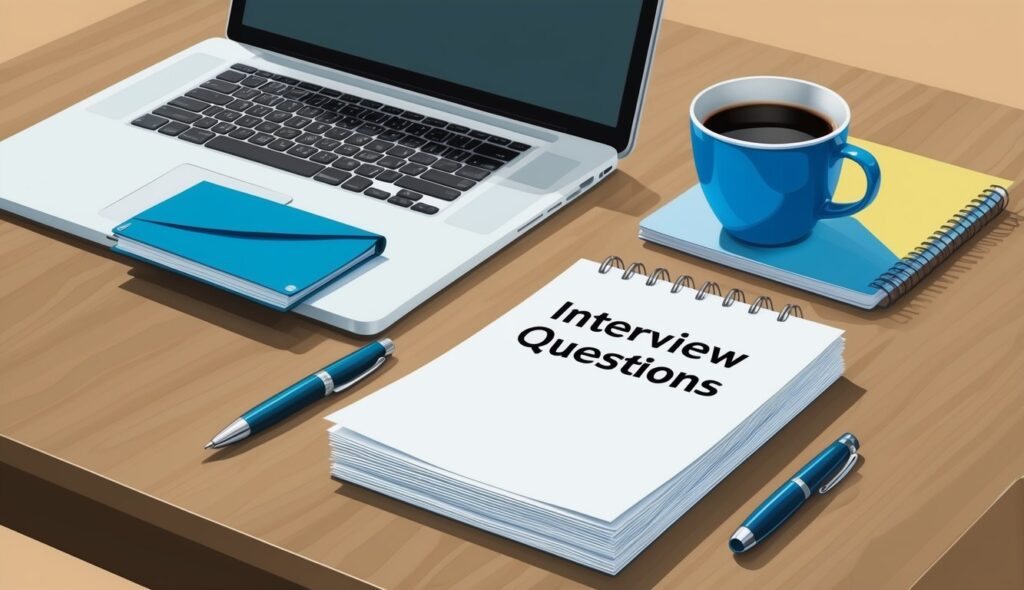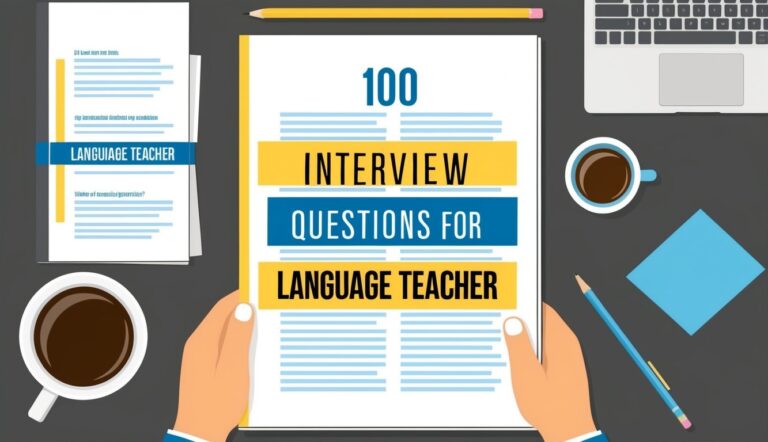35 Fabulous Interview Question Answers for Job: Expert Strategies

Whether you’re entering the workforce for the first time or transitioning to a new career, understanding what employers are looking for can help you shine and leave a lasting impression.

In this guide, you’ll find 35 Fabulous Interview Question Answers for Job and ways to tackle common interview questions. Each answer is designed to give you an edge and show employers the best version of yourself.
You’ll learn strategies to highlight your skills, experiences, and enthusiasm for the role.
By mastering these responses, you can walk into your next interview with more confidence. This preparation will allow you to communicate clearly and leave a lasting impression with any hiring manager.
Understanding the Interview Landscape

When preparing for a job interview, you need to know the type of questions you might face. Hiring managers often use a mix of common interview questions, behavioral interview questions, and situational interview questions.
Common Interview Questions might include inquiries like “Tell me about yourself” or “Why do you want this job?” These questions aim to understand your skills and motivations.
Behavioral Interview Questions explore past experiences to predict future behavior. An example is, “Describe a challenge you faced at work and how you handled it.” Your answers help hiring managers see how you approach problems.
Situational Interview Questions present hypothetical scenarios. Questions like “What would you do if you faced a tight deadline?” test your problem-solving skills and adaptability.
Understanding what hiring managers look for can boost your confidence. Preparing thoughtful answers that relate to the job description can make a lasting impression.
Use lists to organize your responses. For instance:
- Skills: Highlight your relevant skills.
- Experience: Share brief stories of achievements.
- Motivation: Explain why the role excites you.
Knowing these question types helps you anticipate what interviewers want. This preparation can ease nerves and set you up for success.
Preparation Strategies Interview Question Answers for Job: Expert Strategies

Getting ready for an interview means knowing the company and matching your skills to its needs. Focus on the job description and consider how you can fit into their work environment and culture.
Research and Background Knowledge
Before your interview, research the company. Learn about its mission and values to understand its culture. This information helps you align your answers with their goals.
Study the job description closely. Identify key skills they want and be ready to discuss your ability to meet these needs. Think about past experiences where you demonstrated relevant skills.
List of 35 Fabulous Interview Question Answers for Job
35 challenging interview questions along with expert strategies and tips for answering them effectively.

1. Tell me about yourself.
Answer Strategy: Focus on your professional background, key achievements, and what led you to apply for this position. Keep it concise and relevant to the job.
One of the most common questions you’ll encounter in an interview is: “Tell me about yourself.” On the surface, it seems like a simple icebreaker, but how you answer it can set the tone for the entire conversation.
A strong, thoughtful response gives interviewers a glimpse into your professional background, personality, and how you might fit into the organization.
2. What are your greatest strengths?
Answer Strategy: Choose strengths that are relevant to the job. Back them up with examples of how you’ve used these strengths in a professional context.
When you’re asked about your greatest strengths in a job interview, this is an opportunity to showcase the skills and qualities that make you a valuable candidate.
It’s important to highlight strengths that are not only true to your abilities but also aligned with the job requirements. Cover important aspects like: Self-Awareness, Focus on Qualities Relevant to the Role, Provide Evidence or Examples.
3. What is your greatest weakness?
Answer Strategy: Select a genuine weakness but frame it positively. Discuss how you’re working to improve it.
When asked about your greatest weakness in a job interview, it’s essential to answer honestly, but strategically. This question is designed to assess your self-awareness, honesty, and ability to learn and improve.
The key is to choose a weakness that is genuine but not critical to the role, and show how you’re actively working to improve it.
4. Why do you want to work here?
Answer Strategy: Research the company’s values, culture, and recent developments. Align your career goals with the company’s mission.
This question is actually designed to gauge your genuine interest in the company, your understanding of its culture, and how well you align with its values and goals.
It’s not just about telling the interviewer you’re looking for a job, but about showing that you’ve researched the company, are excited about its mission, and see a strong fit for your skills and ambitions.
5. Describe a challenging situation at work and how you handled it.
Answer Strategy: Clearly outline the scenario and your approach.
This question is designed to evaluate your problem-solving abilities, emotional intelligence, and how you manage stress or setbacks in the workplace. Employers want to see how you approach challenges, your ability to think critically under pressure, and how effectively you can navigate difficult situations while maintaining professionalism.
6. Where do you see yourself in five years?
Answer Strategy: Discuss your career aspirations that align with the company’s growth. Show ambition but also a willingness to adapt.
This is a common interview question that aims to assess your long-term goals, ambition, and alignment with the company’s mission. Employers want to understand if you are likely to stay with the organization and if your goals align with the direction of the company.
It also gives them insight into how you plan to grow in your career.
Sample Answer: “In five years, I see myself having grown significantly in my marketing career, ideally as a senior marketing manager or director. I hope to have developed a strong portfolio of successful campaigns, with a deep understanding of data analytics and digital marketing strategies. I also hope to take on leadership responsibilities, mentoring junior team members and helping the marketing department grow. I’m particularly excited about the opportunity to work with your team, as I admire the innovative work your company does in the industry, and I’d love to contribute to the continued success and growth of the brand.”
7. Why should we hire you?
Answer Strategy: Summarize your skills, experiences, and what you can bring to the role that makes you a unique fit.
It’s your opportunity to sell yourself and show the employer why you’re the best candidate for the role. To answer effectively, you should focus on your unique qualifications, skills, and experiences that align with the job requirements and the company’s goals.
Sample Answer: “I believe I’m an excellent candidate for this position because I have strong communication and problem-solving skills, which are essential for providing great customer service. I’ve handled customer inquiries, resolved complaints, and turned frustrated clients into loyal ones. In my previous role, I consistently exceeded customer satisfaction goals, and I’m confident I can bring that same level of dedication to your team. I’m also excited about your company’s commitment to customer care and am eager to help build long-term relationships with clients.”
8. Tell me about a time you failed.
Answer Strategy: Share a specific example, focusing on what you learned and how you applied that lesson in future situations.
This question is designed to assess how you handle failure, learn from mistakes, and demonstrate resilience and accountability. Employers want to know how you react to setbacks and whether you’re capable of self-reflection and growth.
9. How do you handle stress and pressure?
Answer Strategy: Provide examples of stress management techniques you use and situations where you successfully navigated high-pressure environments.
This is a common interview question that seeks to understand how you manage difficult situations, deadlines, or challenging tasks. Employers want to know if you can stay calm and focused when under pressure, how you prioritize your work, and whether you can remain productive in stressful environments.
10. Describe your ideal work environment.
Answer Strategy: Tailor your answer to reflect the company culture and values. Highlight aspects that foster your productivity and creativity.
This question allows you to reflect on the conditions in which you work best, and it’s an opportunity to align your preferences with the company’s culture and values. Employers want to ensure that your ideal work environment matches the type of workplace they offer.
11. How do you prioritize your work?
Answer Strategy: Discuss your time management strategies, such as using tools or methods (like the Eisenhower Matrix) to prioritize tasks effectively.
12. Tell me about a time you worked in a team.
Answer Strategy: Explain how you collaborated, and the outcome of the project.
13. How do you handle criticism?
Answer Strategy: Share an example of constructive criticism you received, how you processed it, and how it led to personal or professional growth.
14. Describe a time you had to learn something quickly.
Answer Strategy: Provide an example where you successfully acquired a new skill or knowledge under a tight deadline and how you applied it.
15. What motivates you?
Answer Strategy: Discuss intrinsic motivators related to the work you do, such as achieving goals, solving problems, or making an impact.
16. How do you approach problem-solving?
Answer Strategy: Outline a systematic approach you take to analyze problems and develop solutions, including examples of successful outcomes.
17. What do you know about our industry?
Answer Strategy: Demonstrate your knowledge of industry trends, challenges, and competitors. Show how this knowledge informs your perspective.
18. How would you handle a disagreement with a colleague?
Answer Strategy: Discuss your conflict resolution skills, emphasizing communication, understanding different viewpoints, and finding common ground.
19. Tell me about a time you went above and beyond.
Answer Strategy: Provide a specific instance where you exceeded expectations, detailing your motivation and the impact it had.
20. What are your salary expectations?
Answer Strategy: Research industry standards and provide a range based on your experience and the value you bring to the role.
21. How do you keep your skills updated?
Answer Strategy: Mention specific courses, certifications, or self-study methods you use to stay current in your field.
22. Describe a time when you had to make a tough decision.
Answer Strategy: Explain the situation, your thought process, and the outcome of your decision.
23. How do you ensure quality in your work?
Answer Strategy: Discuss specific quality control measures you take, such as checklists, peer reviews, or feedback mechanisms.
24. What do you do if you disagree with your boss?
Answer Strategy: Emphasize respectful communication and the importance of understanding their perspective while providing your insights.
25. How do you handle tight deadlines?
Answer Strategy: Share strategies you use to manage time effectively, such as breaking tasks into smaller parts or prioritizing critical tasks.
26. What role do you typically take in team projects?
Answer Strategy: Describe your preferred role, whether it’s a leader, facilitator, or contributor, and provide examples of how you’ve excelled in that capacity.
27. How do you define success?
Answer Strategy: Define success in terms of personal and professional growth, team achievements, and contributions to the company’s goals.
28. Describe a time you had to persuade someone.
Answer Strategy: Illustrate a situation where you successfully influenced someone’s opinion or decision.
29. What is your approach to work-life balance?
Answer Strategy: Discuss your strategies for maintaining balance, such as setting boundaries and prioritizing self-care, while still being committed to your work.
30. How do you handle ambiguity in the workplace?
Answer Strategy: Share an example of navigating uncertainty and how you adapted your approach to achieve clarity and direction.
31. What is your experience with [specific software or tool]?
Answer Strategy: Be honest about your experience level, providing examples of how you’ve used the tool effectively in past roles.
32. How do you build relationships with coworkers?
Answer Strategy: Discuss your interpersonal skills and specific actions you take to foster collaboration and camaraderie in the workplace.
33. What would you do in the first 30 days of this job?
Answer Strategy: Outline a plan for your first month, including learning objectives, relationship-building, and initial contributions you aim to make.
34. How do you stay organized?
Answer Strategy: Describe your organizational tools and methods, such as digital planners, project management software, or systematic filing systems.
35. Do you have any questions for us?
Answer Strategy: Prepare thoughtful questions that demonstrate your interest in the role and the company, such as inquiries about team dynamics, future projects, or company culture.
Frequently Asked Questions: Fabulous Interview Question Answers

This section will address some common interview questions and provide strategies on how to answer them effectively. These responses aim to help you navigate complex questions and showcase your uniqueness as a candidate.
Can you provide examples of in-depth interview questions, and how should one approach answering them?
To tackle in-depth questions, think about the bigger picture. Highlight your past experiences, focusing on what you learned and how you can apply that knowledge to the new role. Be specific and use relevant examples to strengthen your points.
What strategies can be employed to answer deep life-related questions during an interview?
Strategies for answering life-related questions include being honest and reflective. Consider your values and how they align with the company’s mission. Talk about experiences that have shaped your personal and professional growth.
What are the most common behavioral interview questions and how can they be answered effectively?
Behavioral questions often revolve around past experiences and how you handled specific situations. Remain clear and concise while showing your ability to adapt and solve problems.
How should one respond to the interview question “What makes you unique”?
Identify what sets you apart by considering your skills, experiences, or personality traits that are valuable to the job. Provide examples that illustrate your unique qualities and how they contribute to your work.

What is the best way to articulate why you are the perfect candidate for the job?
Articulate why you’re the right fit by aligning your skills and experiences with the job requirements. Research the company’s values and culture, and explain how your background matches their needs. Be clear and enthusiastic about your potential contributions.
Could you list job interview questions and offer guidance on how to answer them comprehensively?
Some common questions include asking about your strengths and weaknesses, your career goals, and why you want to work for the company.
Answer these questions with honesty and focus, providing examples when possible, and always link your answers to how they relate to the role you’re applying for.
All the Best !






